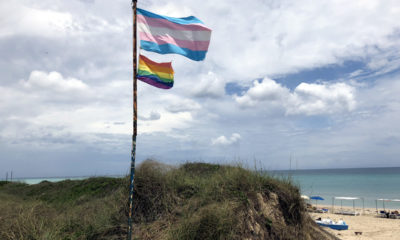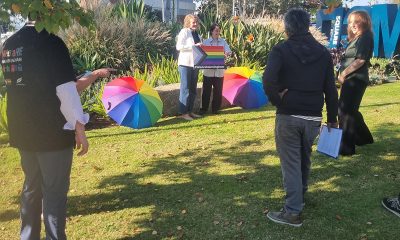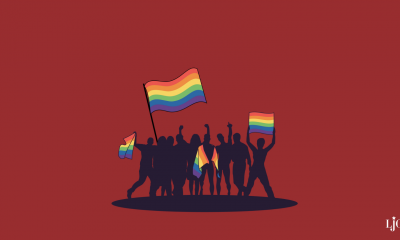News
La iglesia en Cuba donde Dios ama a los gais
Iglesia de la Comunidad Metropolitana acepta a personas LGBTI
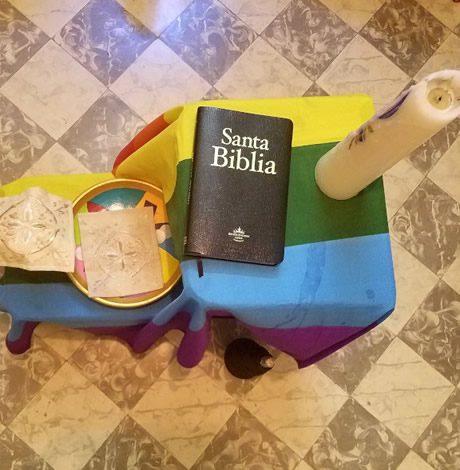
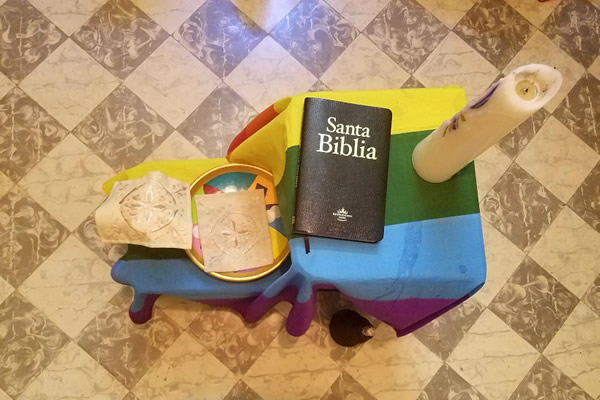
La Iglesia de la Comunidad Metropolitana en Cuba apoya a miembros de la comunidad LGBTI. (Foto de Claudia Padrón/Tremenda Nota)
Esa nota salió originalmente en el sitio web de Tremenda Nota.
LA HABANA — Son las seis de la tarde del lunes dos de septiembre del año dieciocho. Al interior de un pequeño departamento del Vedado, la pastora Elaine Saralegui oficia el culto de una denominación cristiana que acepta a las personas no heteronormativas, a las poliamorosas, a las que creen en otros dioses.
La sala de la casa no es demasiado grande. Aun así caben 12 personas repartidas entre dos butacones y las sillas plásticas que se amontonan en una esquina. Frente a los asientos se levanta un espejo de casi dos metros que refleja la cruz colgada en la pared del frente. Al centro, un cirio y una Biblia, el pan y el vino de la comunión, reposan sobre una pequeña mesa cubierta con la bandera arcoíris.
Algunos fuman y esperan con calma a que comience el culto; otros conversan apasionadamente sobre las reuniones de barrio para discutir el Proyecto de Constitución. Miguel Ángel ― un mulato delgado que usa ropa deportiva ― inició el debate diciendo que “los derechos no se plebiscitan.”
Aunque el país sea tan homofóbico como presenta la cobertura de la televisión, él, un hombre unido con otro hombre, “debería tener los mismos derechos patrimoniales y reproductivos que los demás.”
Justo al frente de Miguel Ángel, una mujer lesbiana ― Niurka ― se pregunta si en Cuba serán mayoría quienes no aceptan el matrimonio igualitario. A su lado, Ana ― madre de una niña de 5 años y pareja de un hombre trans ― no tiene dudas de que “es así.”
Elaine enciende el cirio y da play a una canción cristiana que ocupa la atmósfera de la pequeña sala desde una laptop. Es la señal, el debate debe ser pausado para comenzar el culto. Todas las personas se aproximan y forman un círculo alrededor de la Biblia. Cierran los ojos y ruegan a Dios en una oración que evoca a Cristo junto a deidades yorubas.

Miembros de la Iglesia de la Comunidad Metropolitana en Cuba oran (Foto tomada de la página de Facebook de “Somos ICM en Cuba.”)
Otros grupos de cristianos tradicionales tienen muchas “razones” para criticar a la Iglesia de la Comunidad Metropolitana: ICM acepta a miembros con sexualidades no heteronormativas — desde lesbianas hasta personas queer ―, ordena pastores trans, promueve el activismo LGBTI+, y no condena las religiones afrocubanas.
“Dios tiene muchos nombres y se presenta de innumerables formas,” explicará más tarde Elaine.
En 2012, al interior de la Primera Iglesia Bautista de Matanzas surgió el grupo “Somos” apara apoyar a las personas gais, lesbianas y bisexuales que asistían al templo. El proyecto sobrevivía con discreción, desde el anonimato: salvo el pastor y unos pocos miembros de la congregación, la mayoría de las personas ignoraban su existencia o misión.
Poco a poco fueron sumándose otros creyentes de distintas comunidades de fe hasta que el grupo se convirtió en una especie de refugio para las personas que habían sido excluidas o marginadas por su condición de no heterosexuales.
Tres años después de la creación de “Somos” viajó a la Isla Troy Perry, el obispo fundador de ICM, y reconoció en el proyecto cubano los mismos principios que profesaba su denominación. En ese viaje, el reverendo Perry propuso que Cuba tuviera su propia Iglesia Metropolitana. Así, el 20 de agosto de 2015 nace “Somos ICM” en la ciudad de Matanzas con Elaine Saralegui, una lesbiana, como su pastora.
La primera — y hasta ahora única — pastora de ICM en Cuba tiene 41 años. Luce el cabello oscuro en un corte conocido como garzón; tiene el ichtus — la silueta de un pez usada como símbolo por los primeros cristianos — tatuado en la muñeca derecha. Una cruz de plata le pende del cuello.
Elaine nunca ha ocultado su orientación teológica liberal. Unos años atrás, con su tesis de licenciatura aseguró que las iglesias podían ser más inclusivas hacia la diversidad sexual.
Ahora, con su ejercicio de maestría, llega más lejos: aborda la Teoría Queer ―base de la Teología Queer, en la cual se sustenta ICM ―, que enfatiza que el género, las orientaciones e identidades sexuales no son una verdad biológica, sino el resultado de una construcción social.
Desde que se graduó del Seminario Evangélico de Matanzas, las actitudes desprejuiciadas de Elaine han escandalizado a los cristianos fundamentalistas. La pastora ha sido noticia por bendecir la unión entre personas homosexuales, oficializar la boda simbólica de dos jóvenes mujeres, y participar en las jornadas contra la homofobia y la transfobia junto al Centro Nacional de Educación Sexual (Cenesex).
ICM ha recibido la anuencia del Cenesex para expandirse y darse a conocer en Cuba. La propia Mariela Castro ha apoyado públicamente a la congregación desde sus inicios e, incluso, ha asistido a varias ceremonias religiosas. Aunque no se conozca que la hija del expresidente Raúl Castro profese ninguna fe religiosa, en mayo pasado acompañó a Elaine en una ceremonia de bendición a familias cubanas y parejas homosexuales.
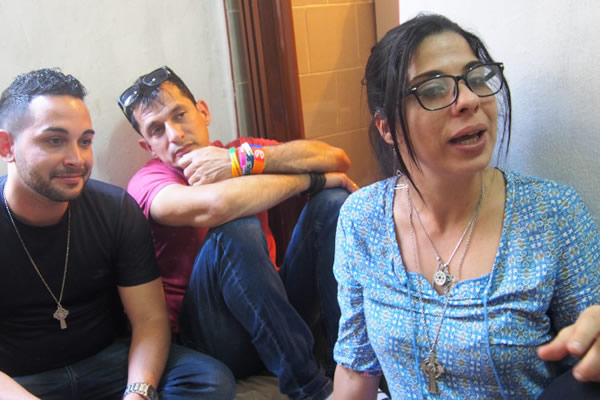
La Iglesia de la Comunidad Metropolitana en Cuba, fundada en Matanzas en 2015, ha logrado extenderse a La Habana y Santa Clara. En la imagen, Elaine Saralegui se prepara para oficiar un culto en Santa Clara. (Foto cortesía de Maykel González Vivero/Tremenda Nota)
Argelia, una transformista encargada de coordinar la Red de Mujeres Lesbianas y Bisexuales de Cuba, lee un versículo que habla del amor por encima de miedos y rechazos. Una hora antes, Argelia había llegado al apartamento número 20 junto a su novia. Es una de las primeras veces que está en el culto.
Cinco días después ambas se irán al festival de música electrónica en el Castillo del Morro como activistas por los derechos de la población LGTBI+. El grupo de ICM en La Habana es un colectivo esencialmente militante.
“En nuestras comunidades de fe trabajamos el activismo desde el respeto al otro y el debate,” explica Elaine mientras fuma un cigarro después del culto. “No respondemos con violencia, no aspiramos a imponer nuestros códigos espirituales o sexuales a los demás, pero sí defendemos nuestro derecho a vivir con dignidad.”
La comunidad metropolitana fue la única denominación religiosa que respondió públicamente a la carta firmada por cinco iglesias protestantes cubanas en contra del matrimonio igualitario, en junio de 2018.
En ese momento ICM dijo: “A nuestros hermanas, hermanos con identidades sexuales y de género no heteronormativas, gays, lesbianas, bisexuales, transgéneros, transexuales, queer, a las personas heterosexuales que defienden estas causas, a las familias diversas, a quienes han perdido la fe por causa de teologías medievales, queremos decirles: ¡Dios existe y les ama! Es poliamoroso y radicalmente inclusivo.”
A esta congregación han llegado personas que no conocían la palabra de Cristo, como Argelia o su pareja. A lado de ellas también hay protestantes de tradición que encontraron por primera vez un espacio donde no son rechazados.
Algunos de las personas que hoy asisten a ICM, antes de conocer la Iglesia Metropolitana, tuvieron que dar testimonio de su “pecado” frente a una congregación radical. En muchos casos fueron sometidos a un rito de exorcismo hasta que pudieran asegurar que Dios los había “curado,” que ya no eran homosexuales.
Si no existiera ICM, Argelia y Ana y Miguel Ángel y Niurka e incluso Elaine no serían aceptados plenamente por otra iglesia cubana. Ninguna de las cinco denominaciones cristianas opuestas al matrimonio igualitario y a la ideología de género les hubiera permitido comulgar sin aludir al “pecado.” Ni la Iglesia Católica hubiera bendecido sus uniones.
Cada lunes, el culto termina con la comunión, sobre las siete de la noche. Las 12 personas que hay en el salón se abrazan mientras escuchan a su pastora. Elaine parte la hostia para colocarla sobre la lengua de una mujer mayor que se adelanta.
Marisabel, la primera persona que recibió hoy “el cuerpo y la sangre de Cristo” es maestra de niños, presbiteriana de formación y madre de un joven rechazado por su antigua denominación. “Vengo aquí porque recibo un mensaje de amor hacia mi familia — dice —. Yo tengo un hijo gay y estoy orgullosa de cómo es.”
“Mi labor como pastora de esta denominación — explica Elaine — es sensibilizar a la comunidad en general con las problemáticas LGTBI+ y también mostrar que se puede ser inclusivo, y no por ello dejar de ser Iglesia.”

South Africa National Assembly Speaker Thoko Didiza on June 17 swore in lesbian feminist Palomino Jama as a new MP.
Jama joins other LGBTQ legislators — including Public Works and Infrastructure Minister Dean Macpherson; Forestry, Fisheries and the Environment Minister Dion George; and Deputy Women, Youth, and Persons with Disabilities Minister, Steve Letsike.
Jama said she will work hard and excel as MP.
“What a great moment to be alive. Thank you youth of 1976, thank you Simon Nkoli, Phumi Mthetwa, Paddy Nhlaphos, Vanessa Ludwig, and others for what you did for the LGBTI people in the 80s and 90s. Lastly, for the fierce fist of the Jamas to always hit where it matters for the people of this country,” said Letsike.
Embrace Diversity Movement, a local LGBTQ organization, said Jama’s inauguration came at an appropriate time, during Pride month.
“Her swearing-in took place during a month of profound significance in June, which marks both international Pride Month and Youth Month in South Africa,” said the group. “Palomino is a seasoned queer activist and dedicated community builder with a distinguished record of leadership and service.”
“The EDM proudly supports Palomino in her deployment to parliament, her presence meaningfully advances youth and queer representation in public office,” added the Embrace Diversity Movement. “We are confident that she will serve the people of South Africa with integrity, courage, and distinction.”
South Africa is the only African country that constitutionally upholds LGBTQ rights. There are, however, still myriad challenges the LGBTQ community faces on a daily basis that range from physical attacks to online abuse.
Letsike in May faced a barrage of online attacks after she released a scathing statement against popular podcaster Macgyver “MacG” Mukwevho, who during a podcast episode in April insinuated that the reason behind popular socialite Minnie Dlamini’s “unsuccessful” relationships were probably due to the bad odor from her genitals.
Letsike, who viewed MacG’s comments as offensive, called for the podcaster to be summoned before parliament’s Portfolio Committee on Women, Youth, and Persons with Disabilities and criticized the local television station that aired the podcast.
X users and other social media subscribers bombarded Letsike with anti-lesbian comments. She, however, was unphased.
Letsike continues to face anti-lesbian comments, even though MacG apologized and the television station on which his podcast had aired cancelled its contract with him.
Israel
Activist recalls experience in Tel Aviv after Israel-Iran war began
Marty Rouse was part of Jewish Federations of North America Pride mission

A long-time activist who was in Israel last month when its war with Iran began has returned to D.C.
Marty Rouse traveled to Israel on June 6 with the Jewish Federations of North America. The 5-day mission ended the night before the annual Tel Aviv Pride parade was scheduled to take place.
Mission participants met with Israeli President Isaac Herzog and several LGBTQ activists in Tel Aviv and Jerusalem. They visited the Western Wall, the Nova Music Festival site, and Nir Oz, a kibbutz in southern Israel that is less than a mile from the country’s border with the Gaza Strip. Mission participants also visited Sderot, a city that is roughly a mile from the Hamas-controlled enclave, a veterans rehabilitation facility, a new LGBTQ health center and the Aguda: The Association for LGBTQ Equality in Israel in Tel Aviv.
Hamas militants on Oct. 7, 2023, killed upwards of 360 partygoers and kidnapped dozens more at the music festival that was taking place at a campground near Re’im, a kibbutz that is roughly 10 miles southwest of Nir Oz. The militants killed or took hostage nearly a quarter of Nir Oz’s residents. They also took control of Sderot’s police station.

Tel Aviv Deputy Mayor Chen Arieli spoke at the mission’s closing party that took place at the Sheraton Grand, a hotel that overlooks Tel Aviv’s beachfront, on June 12.
Rouse and other mission participants planned to stay in Tel Aviv for the Pride parade, which was scheduled to take place the following day. He and Gordie Nathan, another mission participant who lives in Palm Springs, Calif., had checked into a nearby hotel that was less expensive.
“We said our farewells,” recalled Rouse when he spoke with the Washington Blade in D.C. on June 24. “We went to our hotels, and we get the warning, and then all hell broke loose.”
Israel early on June 13 launched airstrikes against Iran that targeted the country’s nuclear and military facilities.
Rouse said mission organizers told him and other participants who remained in Tel Aviv to meet at the Sheraton Grand for breakfast and dinner — Israel’s airspace was closed in anticipation of an Iranian counterattack, and authorities cancelled the Pride parade.
He said he went to bomb shelters at least twice a night for three nights.
Israel’s Home Front Command during the war typically issued warnings about 10 minutes ahead of an anticipated Iranian missile attack. Sirens then sounded 90 seconds before an expected strike.
Rouse and Nathan walked to the Sheraton Grand on June 13 when the Home Front Command issued a 10-minute warning. They reached the hotel in a couple of minutes, and staff directed them to the bomb shelter.
“You know to walk slowly, everything’s fine,” recalled Rouse. “You get 10 minutes, so everything was fine when the alarm goes off.”
Rouse described the Sheraton Grand shelter as “well lit” with WiFi, a television, and air conditioning. He was watching an Israeli television station’s live coverage of the Iranian missile attack when he saw one hit an apartment building in the Tel Aviv suburb of Ramat Gan.
A 74-year-old woman died and her boyfriend was seriously injured.
“I go over to look at the TV, just to watch,” recalled Rouse. “All of a sudden, you watch, and you see one bomb go and land and explode in Tel Aviv on TV. It landed and blew up.”
“I was like, okay, this is real, and so that was scary,” he added.
Rouse said the bomb shelter in the hotel where he and Nathan were staying after the mission ended was far less comfortable.
“It was dark. It was humid. It was hot. It was very uncomfortable,” said Rouse. “You really felt alone.”

Rouse and nearly everyone else on the mission who were in Tel Aviv when the war began left Israel on June 15. They boarded buses that took them to the Jordanian capital of Amman, which is a roughly 2 1/2-hour drive from Tel Aviv through the West Bank.
Rouse described the trip as “like a field trip” until they drove across the Jordan River and arrived at the Jordanian border crossing.
“You walk into this room, and instead of being in a well air-conditioned airport, you’re in this hot, humid, small place in the middle of the desert, packed with people, and those big, large, loud fans and pictures of military people on the walls,” he said. “It was almost like a Casablanca kind of feeling.”
Rouse said Jordanian authorities brought mission participants through customs in groups of 10. A Jewish Federations of North America liaison from Amman who previously worked as a tour guide for A Wider Bridge — a group that “advocates for justice, counters LGBTQphobia, and fights antisemitism and other forms of hatred” — went “behind closed doors” to ensure everyone was able to enter the country.
“It took a really long time,” Rouse told the Blade.

Mission participants arrived in Amman a short time later. They checked into their hotel and then had dinner at a restaurant.
“Now we feel like we’re safe and we’re in Amman,” recalled Rouse. “We’re sitting outside having a beautiful dinner.”
Iranian missiles passed over Amman shortly after Rouse and the other mission participants had begun to eat their dessert. They went inside the restaurant, and waited a few minutes before they boarded busses that brought them back to their hotel.
“No one was openly freaking out, which I was surprised by,” said Rouse.
The group was scheduled to fly from Amman to Cairo at 11 p.m. local time (4 p.m. ET) on June 16. They visited Jerash, an ancient city north of Amman, before their flight left Jordan.
“[The Jerash trip] actually took our minds off of everything,” said Rouse.
A Jewish Federations of North America contact met Rouse and the other mission participants at Cairo’s airport once their flight landed. Rouse arrived at JFK Airport in New York on June 17.
Trump-announced ceasefire ended 12-day war
President Donald Trump on June 23 announced a ceasefire that ended the 12-day war.
The U.S. three days earlier launched airstrikes that struck three Iranian nuclear sites. The ceasefire took effect hours after Iran launched missiles at a U.S. military base in Qatar.
Iran said the war killed more than 900 people in the country.
The Associated Press notes Iranian missiles killed 28 people in Israel. One of them destroyed Tel Aviv’s last gay bar on June 16.
The war took place less than two years after Oct. 7.
The Israeli government says Hamas militants on Oct. 7, 2023, killed roughly 1,200 people on that day when it launched its surprise attack on the country. The militants also kidnapped more than 200 people.
The Hamas-controlled Gaza Health Ministry says Israeli forces have killed nearly 55,000 people in the enclave since Oct. 7. Karim Khan, the International Criminal Court’s chief prosecutor, has said Israeli Prime Minister Benjamin Netanyahu and former Hamas leader Yahya Sinwar, who the IDF killed last October, are among those who have committed war crimes and crimes against humanity in Gaza and Israel.

Rouse upon his return to the U.S. said he “was never as aware of the comfort of another human being than I was during that time.” Rouse affectionately called Nathan his “bomb shelter boyfriend” and even questioned the way he reacted to the missile alerts.
“He’s sitting on the edge of the bed and he goes, okay, I’m going to put on my socks and my shoes, and I say, really? You’re going to put on your socks,” Rouse told the Blade. “The fact that I was nervous, that putting on socks might have changed the direction of our lives, to me was like I can’t believe I said that to him.”
Rouse quickly added Nathan helped him remain calm.
“If I was by myself, those nights would have been long enough,” said Rouse. “It’s a totally different feeling to be with another human that you know than to be by yourself.”

Rouse also praised the Jewish Federations of North America.
“JFNA really sprung into action and started to figure out all options to get us all safely home,” said Rouse. “It was all about logistics. Staff worked around the clock identifying and then mobilizing to get us back to the states. It was a great team effort and I know I speak for everyone in expressing our deep appreciation for their dedication to getting us safely home.”
Congress
Congress passes ‘Big, Beautiful Bill’ with massive cuts to health insurance coverage
Roughly 1.8 million LGBTQ Americans rely on Medicaid

The “Big, Beautiful Bill” heads to President Donald Trump’s desk following the vote by the Republican majority in the U.S. House of Representatives Thursday, which saw two nays from GOP members and unified opposition from the entire Democratic caucus.
To partially offset the cost of tax breaks that disproportionately favor the wealthy, the bill contains massive cuts to Medicaid and social safety net programs like food assistance for the poor while adding a projected $3.3 billion to the deficit.
Policy wise, the signature legislation of Trump’s second term rolls back clean energy tax credits passed under the Biden-Harris administration while beefing up funding for defense and border security.
Roughly 13 percent of LGBTQ adults in the U.S., about 1.8 million people, rely on Medicaid as their primary health insurer, compared to seven percent of non-LGBTQ adults, according to the UCLA School of Law’s Williams Institute think tank on sexual orientation and gender identities.
In total, the Congressional Budget Office estimates the cuts will cause more than 10 million Americans to lose their coverage under Medicaid and anywhere from three to five million to lose their care under Affordable Care Act marketplace plans.
A number of Republicans in the House and Senate opposed the bill reasoning that they might face political consequences for taking away access to healthcare for, particularly, low-income Americans who rely on Medicaid. Poorer voters flocked to Trump in last year’s presidential election, exit polls show.
A provision that would have blocked the use of federal funds to reimburse medical care for transgender youth was blocked by the Senate Parliamentarian and ultimately struck from the legislation — reportedly after the first trans member of Congress, U.S. Rep. Sarah McBride (D-Del.) and the first lesbian U.S. senator, Tammy Baldwin (D-Wis.), shored up unified opposition to the proposal among Congressional Democrats.
-

 U.S. Supreme Court3 days ago
U.S. Supreme Court3 days agoSupreme Court to consider bans on trans athletes in school sports
-

 Out & About3 days ago
Out & About3 days agoCelebrate the Fourth of July the gay way!
-

 Virginia3 days ago
Virginia3 days agoVa. court allows conversion therapy despite law banning it
-

 Federal Government5 days ago
Federal Government5 days agoUPenn erases Lia Thomas’s records as part of settlement with White House

